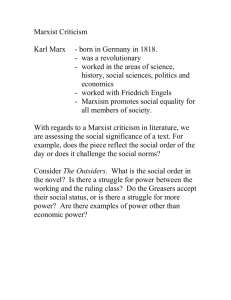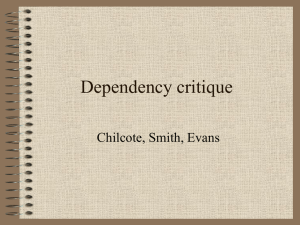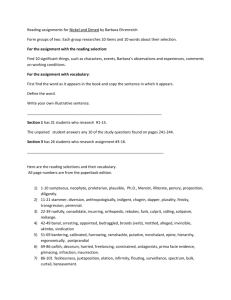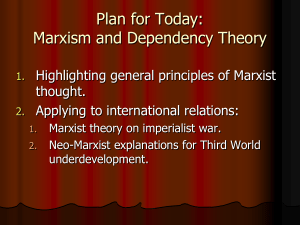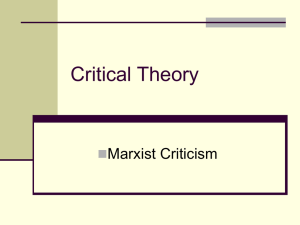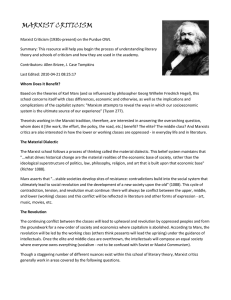RADICAL THEORIES
advertisement
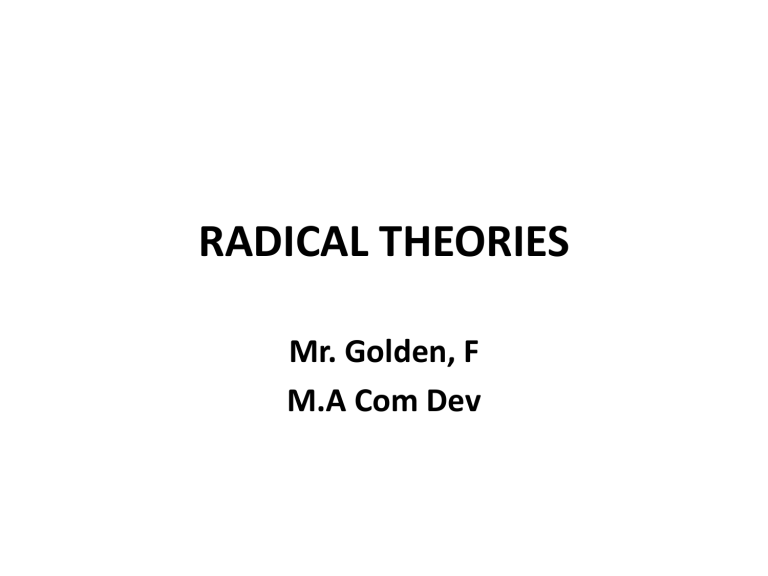
RADICAL THEORIES Mr. Golden, F M.A Com Dev Radicals… • Is groups of doctrines and different critical thought that attempt to provide critical analysis of the development processes. • These are dependency theory and Structural functionalism or structural tradition • Are found to provide some key contributions on development. DEPENDENCY THEORISTS • Dependence is a conditioning situation in which the economies of one group of countries are conditioned by the development and expansion of others. • A relation of interdependence between two or more economies or between such economies and the world trading system becomes a dependent relationship when some countries can expand on as a reflection of the expansion of the dominant countries, which may have positive or negative effects on their immediate development". (Dos Santos, 1970). Dependency… • Dependency theorists are concerned with the whole relationship between advanced countries and third world countries. • The dependent relationship is exhibited in cultural as well as economic features of third world countries. • The dependent relationship pervades political institutions and political decision making as well. • As a result many third world countries are incapable of following an alternative path. Dependency… • This is not only because the world economic facts of life make it impossible, but because the cultural, psychological and economic pressures of the dependent relationship have conditioned decisionmakers in third world countries so that they do not wish to follow an alternative strategy. • Dependency theorists concentrate on explaining the fundamental specific flows of modernization approaches. • They agree that some effort within developing countries must be made to break the cycle of economic and political reliance on dominant capitalist nations. Dependency… • A central argument of the dependency school is that dependence generates underdevelopment. • The underdevelopment theorists challenged the conventional wisdom of western economists of the 1950s, as illustrated by Walt Rostow's stages of growth. • This conventional wisdom held that growth and development were unlinear; that there were various stages of development that societies went through on the way to industrialization and development. • The poor countries of the world were simply a replicator of the industrialized countries at a previous stage of development. Dependency… • Given the right sort of conditions they would inevitably occur, given the right sort of conditions. • Theories of underdevelopment the unlinear and progress view of development. • They argued that the third world differed from the advanced countries at an earlier stage because of the existence of the advanced countries, and the impact of their society on them. Dependency… • Dependency theorists argue that the economy of underdeveloped countries cannot not be analyzed in isolation from the development of capitalist countries because their economy was in large part conditioned by events in the advanced countries; through trade, migration, capital and technology flows. • In this way the advanced capitalist countries determine the nature of the economy of third world countries. Dependency… • Dependency theorists argue that the underdeveloped state of third world countries was attributed not to the fact that they were at an earlier stage of history than the advanced countries, but to the fact that the impact of the advanced countries on the third world had caused their underdevelopment. • The nature of the impact of the advanced countries, particularly of the capitalist According to Frank underdevelopment was not an original stage, but rather a created condition; to emphasize this, he points to the British de-industrialization of India, the destructive effects of the slave trade on African societies and the destruction of the Indian civilizations in central and South America. Dependency… • The first prerequisite of following nondependent relationship and impoverishing policies is then to break the dependent relationship. • But even this may not be possible because of the all-embracing nature of dependency preventing any such breakout. Critique of Dependency Theory • Theories of dependency, world-systems and underdevelopment (Wallerstein 1974) certainly have their limitations, particularly in neglecting the role of contemporary internal political and economic conditions, but this does not justify a complete abandonment of those theories, and their underlying historical observations. • External dependency, in the past and at present, is a necessary but not a sufficient factor to reckon with in explaining lack of development. • In pursuing this line of study, internal politics must certainly be added to the analysis of external impacts, but always with a historical approach, and with some methodological stringency in defining development, and underdevelopment, before attempting to explain them. STRUCTURAL FUNCTIONALISM • Pulling together various threads in non-Marxist social science, Talcott Parsons in sociology and later Gabriel Almond in political science became the flag-bearers of structural functionalism. • This theory implied that societies regardless of their peculiarities inherently perform the same basic functions, but they are differentiated in terms of which structures perform these functions. • Thus, for instance, a country's development is measured in terms of how its different structures perform, the assumption being that the more pluralistic a country, the more it develop. • Pluralism entails many countries structures contribution differently in achieving growth in development programs Structural functionalism… • Structural functionalism was built on the assumption that development is a linear evolution, involving structural differentiations and cultural secularization, using western democracy as the ultimate stage (refer to Rostow, Nurkse's theories of development). • Structures were the facilitators of development. Structural functionalism was meant to be a counter point to the Universalist ambitions of Marxist theory. Critics of structural functionalism • By the second part of the 1960s, the critique of structural functionalism had grown to such an extent that its leading role was in question. • A careful scrutiny of its basic premises suggested that they were unattenable. • Future development theory had to seek its inspiration from other sources. NEO-LIBERAL POLITICAL ECONOMY • Foremost of these was the neo-liberal ‘rational choice’ theory which began its impact on development theory in the latter part of the 1970s. • Contrary to both structural functionalism and neo-Marxist political economy, this new theory stressed the importance of individual actors. • To them development is the aggregate outcome of a multitude of individual decisions. • Operating in a market context, people make their own decisions in a voluntary fashion. • Samuel Popkin (1979) and Robert Bates (1981) are among the leading neo-liberals. • This is essentially a theory of the market. THE NEW INSTITUTIONALISM • This theoretical approach is concerned with ‘institutions’, the layer between individual actors and societal structures. • The theory retains what is largely a voluntarist perspective, but argues that social action is primarily integrative, aimed at going beyond self -interest. • This theoretical perspective corresponds to the ideological concern with an ‘enabling environment’. • The focus is on institutional issues: the question of how to strengthen institutions (‘institution-building’) and the constraints and opportunities for using them as ‘tools’ of development. New Institutionalism… • Leading advocates of this theoretical approach include Amitai Etzioni, Aaron Wildawsky, James March and J.P. Olsen. • All the above theoretical contribute to the debate on development but are as other theories before them unable to provide a more critical understanding of the development processes in Africa. • More important they fail to provide alternative development strategies to address development problems in Tanzania. MARXIST UNDERSTANDING OF SOCIAL DEVELOPMENT • Marxist theory is one of the leading theories that attempt to provide a critical analysis of the development process. • The Context of Marxist Theory • The founder of Marxist theory was Karl Marx, a German philosopher who lived during the nineteenth century in Europe. • Marx lived during a period when the overwhelming majority of people in industrial societies were poor. • This was the early period of industrialization in such nations as England, Germany, and the United States. MARXIST… • Those who owned and controlled the factories and other means of production exploited the masses that worked for them. • The rural poor were forced or lured into cities where employment was available in the factories and workshops of the new industrial economies. • In this way the rural poor were converted into an urban poor. • In the United States, children some as young as five or six years old, were employed in MARXIST… • the cotton mills of the of the South. • They worked 12 hours a day at the machines, six and seven days a week (Lipsey and Steiner, 1975), and received only a subsistence wage. • The "iron law of wages"-the philosophy that justified paying workers only enough money to keep them alive-prevailed during this early period of industrialization. • Meanwhile, those who owned the means of production possessed great wealth, power, and prestige. • Marx tried to understand the institutional framework that produced such conditions and looked for a means to change it in order to improve the human condition. MARXIST… • On development of society Marx argues that the entire history of human societies may be seen as the history of class conflict: the conflict between those who own and control the means of production and those who work for them-the exploiters and the exploited. • He believed that ownership of the means of production in any society determines the distribution of wealth, power, and even ideas in that society. • The power of the wealthy is derived not just from their control of the economy but from their control of the political, educational, and religious institutions as well. Marxist Perspective: Main Elements within Marxism • The dialectical approach to knowledge and society defines the nature of reality as dynamic and conflictual. • Changes are due to class struggle and the working out of contradictions inherent in social and political phenomena. • According to Marx Men make their own history, but not in circumstances of their own choosing and not just as they please” Marxist Main Elements… • The second element of Marxism is a materialist approach to history; the development of productive forces and economic activities is central to historical change and operates through the class struggle. • Struggle over distribution of the social product/surplus The primacy of class struggle, thus Marx made class domination central to his conception of social order, and class conflict a defining feature of change in society. • Marxists believe that a socialist society is both the necessary and desirable end of historical development. • This will be achieved through overthrow of the ruling class and the establishment of a dictatorship of the proletariat. Marxist Main Elements… • Marx argues that at a certain stage of their development, the material productive forces of society come into conflict with the existing relations of production; • There then results a transformation of the economic conditions of production, and with the change of the economic foundation, the entire superstructure is also transformed. • In other words, Marx held that a revolutionary situation occurs when an existing mode of production reaches the limits of its contradictions. Marxist Main Elements… • social forces and the social relations of production. In turn, intensifying class conflict is generated between the existing dominant class and the rising revolutionary class. Marxist theory strongly suggested that revolutions should occur first in the most economically advanced social formations of a given mode of production. Marx’s five stage of development of society • Karl Marx identified five major stages of development; this included primitive communalism, feudalism, Capitalism, Socialism and communalism Communal mode of production Primitive - Communalism • It marks the rise of society from sheer animals to human society; • It is a stage which was characterized by crude and underdeveloped instruments of labor, due to this primitive man was unable to engage in production alone without the help of others. • The means of production were communal owned and the relations of productions were collective, people lived together jointly conducting their economic activities for survival. • Labor productivity was low with no surplus and the product were equally distributed, there were no formal organization, no classes and therefore no states, kingdoms etc. • People organized themselves in clan of family. • It is notable that at this stage there are no classes and no class struggle Feudal mode of production (Feudalism) • This was the stage of emergence of surplus in production and classes • It was based on class antagonism, conflict struggle between opposing classes • Land was the private property and consisted of two classes the land owners and the serfs, serfs were not slaves because they had land holding to build their shelters, they rented this land holdings from their land lords • How ever the serves owned their means of labor. • Land lords exploited the serfs and the serfs struggled to free themselves from this exploitative relationship. • Contradictions and growing class struggle lead to disintegration of feudalism Capitalism • This mode of production emerged as a result of industrial revolution in Europe • Capitalism lead to the emergence of commodity production where all products became commodities that were produced for exchange • Human labor also became a commodity. • This mode of production is characterized by the private ownership of means of production. • Relations of production are exploitative where capitalists who are the owner of means of production exploit the workers. • The working class is exploited by selling their labor power. According to Marxist, capitalist economies expand through export of capital and this became driving force for imperialistic mode of production. • The contradiction between capital and labor led to the down fall of capitalism Socialism • The socialism mode of production emerged after the overthrow of the capitalist system. • According to Marx Socialism is a logical stage of Social development after mature capitalism, it is the consequence of growth of productive forces. • Socialism establishes a dictatorship of the proletariat/working class. • The means of production are owned and controlled by the public including the distribution of products; all means of production are in the hands of the working class. • Relations of production are antagonistic-non exploitative kind of relations. • People work according to their abilities and are remunerated according to their need, the distinction between physical and mental labor disappear and like wise the difference between the city and the country side Communalism • Is the highest level of social development where there is absence of exploitative relations of production • There is a withering away of economy to wards state towards classless society • Investment and consumption are primarily determined by the national plan • Thus Marx explains the inner logic of social change by emphasizing that social transformation can not take place independently of the economic structure, but ownership relations are one part of the economic basis • The other being the forces of production that is the character of technology of the kind of tools that are used in certain stage of development Communism… • Thus the conflict of economic classes will depend on the technological level of development of the society. • From Marxist Perspectives development is seen as the unfolding in human history of the progressive emancipation of people and nations. • A major task therefore becomes that of explaining why this possess has progressed much more with some peoples and nations than others Critique of Marxist analysis • Marxist is criticized by concentrating too much on conflict, class struggle and change and dwelling too little on what produces stability in society. • They are also criticized for being too ideological in their analysis refute. • The celebrated African theorists and Political activists Amilcar Cabral argued that those who affirm that the motive force of history is the class struggle would certainly agree to the revision of this affirmation to make it more precise and give it a wider field of application if they had a wider knowledge of certain colonized country (imperialism). • General Cabral is pointing out on some of the inadequacy of Marxism in providing essential knowledge on the characteristics of imperialism in underdeveloped countries Critique of Marxist analysis… • Many African economy are agricultural centered, countries • Many farmers do operate under subsistence level as opposed to the developed countries where industrial revolution dictated the investment in large farms • In this case no class struggle that can be expected at subsistent farming • Others have criticized Marxism that the theory does not give particular attention to African situation • In other words what kind of classes existed in Africa, what were the nature of class struggle and the relation of production in Africa • So one can argue that Marxt theory of underdevelopment is not complete Critique of Marxist analysis… • Marxist policy prescribes for developing country is that only a radical break on the part of developing countries with a global capitalist system will permit genuine development • Although this prescription remain valid for the developing world, Marxist theory does not highlight the unique and the varying situation of the developing countries • This universality gives it difficult to put in practice in different third world countries Marxist Theory – Its Impact on Contemporary Theories on Social Development • Marxist Theory Marxism as an ideology and theory of social change has had an immense impact on the practice and the analysis of social movements. • Marxism arose from an analysis of movements structured by conflicts between industrial workers and their capitalist employers in the 19th century. • In the 20th century a variety of neo-Marxist theories have been developed that have opened themselves to adding questions of race, gender, environment, and other issues to an analysis centered in (shifting) political economic conditions. Marxist Theory – Its Impact… • Class-based movements, both revolutionary and laborreformist, have always been stronger in Europe than in the U.S. and so has Marxist theory as a tool for understanding social movements but important Marxist movements and theories have also evolved in the US. • Marxist approaches have been and remain influential ways of understanding the role of political economy and class differences as key forces in many historical and current social movements, and they continue to challenge approaches that are limited by their inability to imagine serious alternatives to consumer capitalist social structures. Bourgeois Theorists and Marxists Theories: A Comparative Analysis • We can recognize some broad similarities between Rostow's analysis and Marx's sequence of social development. • Both are attempts to interpret the evolution of whole societies primarily from an economic perspective. • Both recognize that economic change has social, political and cultural consequences. References • Himmelstrand, U; Kinyanjui, K and E. Mburugu (Eds.) (1994) African Perspectives on Development, Mkuki na Nyota: DarEs-Salaam • Seers, D. “ The Meaning of Development”, International Development Review Vol. 19 No.2 1972, pp.2-7 • Rostow, W.W. “The Take-off into Self-Sustained Growth.” In Agarwala, A. and S. Singh (eds.) The Economics of Underdevelopment. New York: Oxford University Press, 1963, pp. 154- 186. • Wilber, C and K. Jameson, Paradigms of Economic Development and Beyond.” In Wilber C. (ed.). Political Economy of Development and Underdevelopment. New York: Random House, 1983, pp.4-25 References… • Chole E., W. Mlay • Frank, A. “The Development of Underdevelopment” in Wilber, C. op.cit. pp.99107 • Baran, P. “On the Political Economy of Backwardness.”, in Wilber, C. (ed.) op. Cit. 87- 98 • Frank, A. Crisis in the Third World, New York: HM Publishers 1981 • Msambichaka, L, H.P.B. Moshi and F. P. Mtatifikolo (eds.) Development challenges and Strategies for Tanzania: An Agenda for the 21st Century, Dar-es-Salaam: Dares- Salaam University Press. 1994 • Gemmell, N. (ed.) Surveys in Development Economics, New York: Basil Blackwell, 1987 • Rodney • Development, Mkuki na Nyota: Dar-es-Salaam
